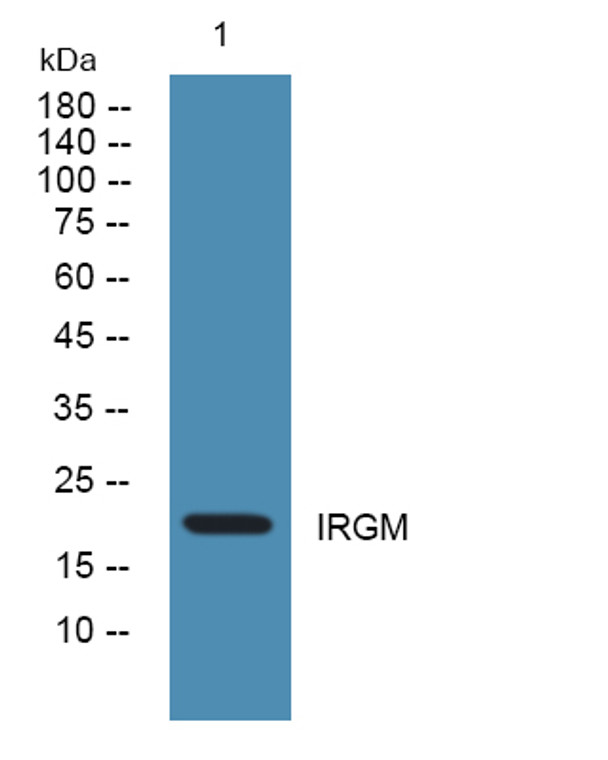| Host: |
Rabbit |
| Applications: |
WB/ELISA |
| Reactivity: |
Human/Rat/Mouse |
| Note: |
STRICTLY FOR FURTHER SCIENTIFIC RESEARCH USE ONLY (RUO). MUST NOT TO BE USED IN DIAGNOSTIC OR THERAPEUTIC APPLICATIONS. |
| Short Description: |
Rabbit polyclonal antibody anti-Immunity-related GTPase family M protein (101-150 aa) is suitable for use in Western Blot and ELISA research applications. |
| Clonality: |
Polyclonal |
| Conjugation: |
Unconjugated |
| Isotype: |
IgG |
| Formulation: |
Liquid in PBS containing 50% Glycerol and 0.02% Sodium Azide. |
| Purification: |
The antibody was affinity-purified from rabbit antiserum by affinity-chromatography using epitope-specific immunogen. |
| Concentration: |
1 mg/mL |
| Dilution Range: |
WB 1:500-2000ELISA 1:5000-20000 |
| Storage Instruction: |
Store at-20°C for up to 1 year from the date of receipt, and avoid repeat freeze-thaw cycles. |
| Gene Symbol: |
IRGM |
| Gene ID: |
345611 |
| Uniprot ID: |
IRGM_HUMAN |
| Immunogen Region: |
101-150 aa |
| Specificity: |
IRGM Polyclonal Antibody detects endogenous levels of protein. |
| Immunogen: |
Synthesized peptide derived from the human protein at the amino acid range 101-150 |
| Post Translational Modifications | Ubiquitinated via 'Lys-63'-linked polyubiquitination in a NOD2-dependent process. 'Lys-63'-linked polyubiquitination is required for interactions with the core autophagy factors. |
| Function | Immunity-related GTPase that plays important roles in innate immunity and inflammatory response. Acts as a dynamin-like protein that binds to intracellular membranes and promotes remodeling and trafficking of those membranes. Required for clearance of acute protozoan and bacterial infections by interacting with autophagy and lysosome regulatory proteins, thereby promoting the fusion of phagosomes with lysosomes for efficient degradation of cargo including microbes. Regulates selective autophagy, including xenophagy and mitophagy, both directly and indirectly. Directly regulates autophagy by acting as a molecular adapter that promotes the coassembly of the core autophagy machinery to mediate antimicrobial defense: IRGM (1) activates AMPK, which in turn phosphorylates ULK1 and BECN1 to induce autophagy, (2) promotes the coassembly of ULK1 and BECN1, enhancing BECN1-interacting partners and (3) influences the composition of the BECN1 complex, by competing with the negative regulators BCL2 and RUBCN, to trigger autophagy. Also activates autophagy by promoting recruitment of STX17 to autophagosomes. In collaboration with ATG8 proteins, regulate lysosomal biogenesis, a fundamental process for any autophagic pathway, by promoting TFEB dephosphorylation. Also modulates autophagy by assisting with autophagosome formation and preventing lysosomal deacidification. While activating autophagy, acts as a key negative regulator of the inflammatory and interferon responses both by (1) promoting mitophagy and (2) mediating autophagy-dependent degradation of effectors of the inflammatory response. Promotes degradation of damaged and IFNG/IFN-gamma-stressed mitochondria via mitophagy, preventing cytosolic release of ligands that activate inflammation. Acts as a suppressor of inflammation by promoting recruitment of inflammation effectors, such as CGAS, RIGI/RIG-I and NLRP3, to autophagosome membranes, leading to their SQSTM1/p62-dependent autophagic degradation. Also directly inhibits assembly of the NLRP3 inflammasome by preventing the association between NLRP3 and PYCARD. Acts as a negative regulator of antiviral innate immune response by suppressing the RIPK2-dependent pro-inflammatory response: mediates recruitment of RIPosomes, composed of RIPK2 and NOD1 or NOD2, to autophagosome membranes, promoting their SQSTM1/p62-dependent autophagic degradation. Isoform IRGMd: Acts as a positive regulator of mitophagy in response to intracellular mycobacteria infection: specifically binds cardiolipin, leading to its translocation to mitochondria, where it promotes affected mitochondrial fission and mitophagy. (Microbial infection) Following infection by hepatitis C virus (HCV), promotes HCV-triggered membrane remodeling, leading to autophagy and Golgi fragmentation, a step required for HCV replication. |
| Protein Name | Immunity-Related Gtpase Family M ProteinImmunity-Related Gtpase Family M Protein 1Interferon-Inducible Protein 1Lps-Stimulated Raw 264.7 Macrophage Protein 47 HomologLrg-47 |
| Cellular Localisation | Golgi Apparatus MembraneCell MembraneCytoplasmic VesiclePhagosome MembraneAutophagosome MembraneLysosome MembraneLate Endosome MembraneMitochondrion MembraneCell ProjectionPhagocytic CupBehaves Like An Integral Membrane ProteinRecruited To The Plasma Membrane Around Forming Phagocytic CupsIt Remains Associated With Maturing PhagosomesAssociation With Phagosomes Is Dependent On Nucleotide-Binding But Is Ifng-IndependentAlso Detected In Late Endosomes And LysosomesIsoform Irgmd: Mitochondrion |
| Alternative Antibody Names | Anti-Immunity-Related Gtpase Family M Protein antibodyAnti-Immunity-Related Gtpase Family M Protein 1 antibodyAnti-Interferon-Inducible Protein 1 antibodyAnti-Lps-Stimulated Raw 264.7 Macrophage Protein 47 Homolog antibodyAnti-Lrg-47 antibodyAnti-IRGM antibodyAnti-IFI1 antibodyAnti-IRGM1 antibodyAnti-LRG47 antibody |
Information sourced from Uniprot.org
12 months for antibodies. 6 months for ELISA Kits. Please see website T&Cs for further guidance







